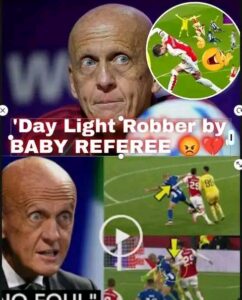Renowned former football referee Pierluigi Collina has weighed in on the contentious decision that nullified Martin Ødegaard’s goal in Arsenal’s clash against Porto, branding it as “daylight robbery.” The incident occurred during a highly anticipated Champions League fixture, where Ødegaard appeared to have scored a crucial goal for the Gunners. However, the goal was disallowed due to a disputed offside call, much to the disappointment of Arsenal fans and players alike.

Collina, known for his distinguished career as a referee, has expressed strong disagreement with the decision, arguing that Ødegaard’s goal should have stood. His stance resonates with many football enthusiasts who viewed the decision as unfair and mistaken, particularly given its potential impact on the game’s outcome.
The disallowed goal proved to be pivotal, potentially altering the course of the match and depriving Arsenal of a significant advantage. Collina’s characterization of the decision as “daylight robbery” underscores the gravity of the controversy surrounding the incident, highlighting the perception that Arsenal were unjustly denied a legitimate scoring opportunity.
Collina’s involvement adds a notable perspective to the ongoing discussion surrounding the disputed decision, intensifying calls for greater scrutiny and accountability in refereeing judgments. As a figure revered for his integrity and expertise in officiating football matches, his assessment carries considerable weight and may prompt further scrutiny of the incident.
In conclusion, Pierluigi Collina’s assertion that Martin Ødegaard’s disallowed goal constituted “daylight robbery” underscores the controversy and dissatisfaction surrounding the decision. The incident serves as a poignant reminder of the importance of precision and accountability in refereeing, as well as the potential ramifications of disputed judgments on football match outcomes.